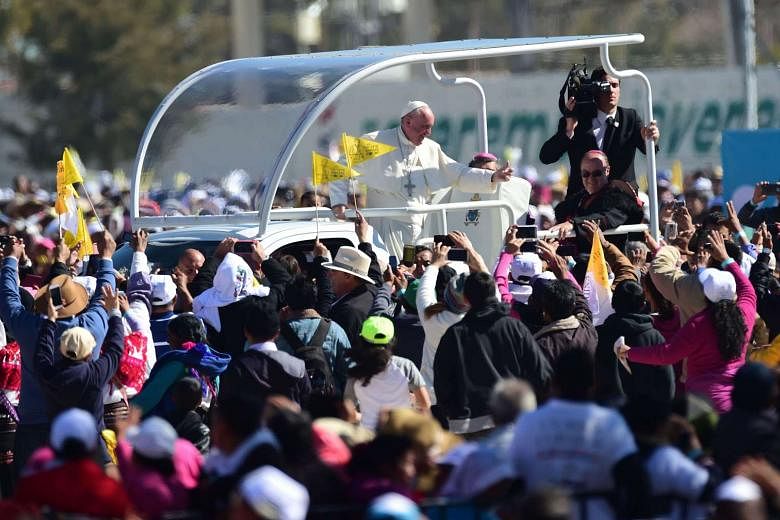SAN CRISTOBAL DE LAS CASAS, Mexico (AFP) - Pope Francis asked Mexico's indigenous population on Monday (Feb 15) for forgiveness over the exclusion they have suffered as he led a mass in native languages in impoverished Chiapas state.
The pope said a short phrase in one of the southern region's native tongues in a sign of his effort to reach out to indigenous communities of the country's poorest and least Catholic state.
Tens of thousands of people flocked to a sports field in the southern city of San Cristobal de las Casas for the service, as women dressed in embroidered dresses led biblical readings and hymns in the Chol, Tzotzil and Tzeltal languages.
"On many occasions, in a systematic and organised way, your people have been misunderstood and excluded from society," the 79-year-old Argentine-born pontiff said.
"Some have considered your values, culture and traditions to be inferior. Others, intoxicated by power, money and market trends, have stolen your lands or contaminated them. How sad this is," he said.
"How worthwhile it would be for each of us to examine our conscience and learn to say, 'Forgive me!'"
The pope issued a decree allowing indigenous languages to be used during Catholic masses. More than a quarter of Chiapas's population speaks an indigenous language.
"If the church is to stop the hemorrhaging of indigenous (populations) in Chiapas and across Latin America, it must offer more masses in indigenous languages and recruit indigenous priests who are very small in numbers," Andrew Chesnut, religious studies professor at Virginia Commonwealth University, told AFP.
While Mexico is the world's second most populous Catholic nation after Brazil, with 82 per cent of its population of 122 million identifying with the religion, only 58 per cent are loyal to the Vatican in Chiapas.
"Long live the pope of the indigenous people!" some shouted from the roofs of their homes as the pope arrived at the field, where a replica of the yellow facade of the city's cathedral served as background to the large stage.
The pope's visit comes in the middle of an intense, five-day trip that he has used to speak out against crime and corruption.
Pope Francis also used the mass to warn that the Earth faces "one of the greatest environmental crises in world history," saying that indigenous people have much to teach about how to "interact harmoniously with nature."
After the mass, Francis will visit San Cristobal's cathedral, where he is expected to visit the tomb of Samuel Ruiz, a bishop who defended the causes of the Mayan people and acted as mediator between the government and the Zapatista guerrilla movement that rose up in 1994.
Lingering tensions over the state's social problems reemerged last week, when around 100 indigenous people protested in front of San Cristobal's cathedral and spray-painted the words "we don't want the pope, we want justice" on its yellow walls.
But the demonstrators dispersed over the weekend, authorities repainted the cathedral. During his visit, a family will show him funds that were collected to build two new shelters for migrants in a region that is a gateway for Central Americans who risk their lives in a gang-infested journey to the United States.
The first Latin American pope - himself the son of Italians who migrated to Argentina - has staunchly defended migrants.
During a huge mass on Sunday in Ecatepec, a Mexico City suburb, he urged Mexicans to build a nation where "there will be no need to emigrate in order to dream."
But Alejandro Solalinde, a priest known as an activist for migrant rights, said that while the pope has made "migrants his pastoral priority," his message will "not change the heavy-handed public policy" on migration.
Mexican authorities launched a crackdown on illegal migration along its southern border with Guatemala in 2014 following a crisis of unaccompanied child migrants to the United States.
Later, the pope will have lunch with two local bishops and eight indigenous Mexicans. He will also meet indigenous families in neighboring Tuxtla. But not all were in a festive mood.
"We know that the government wants to hide things or make it seem that everything is all right. But we know that this is not true," said Octavio Gomez, a 45-year-old Tzeltal. "There are problems: Poverty, marginalization, displaced people."

